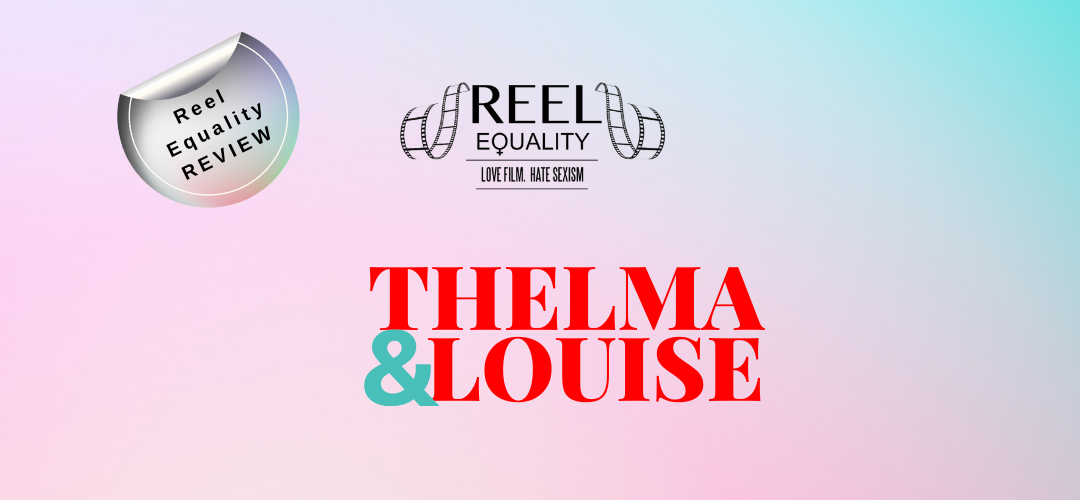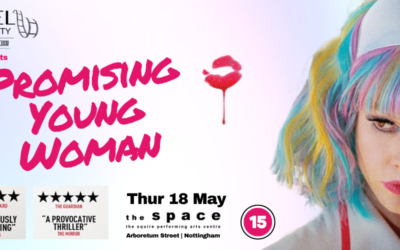Reel Review: Thelma and Louise
By Kelly, Reel Equality Film Club Volunteer, 31st March 2021.
Much discussion and deliberation has gone into the way Reel Equality Film Club chooses films for screenings. We’ve detailed many ways in which a film could represent women in fair or unfair ways, and created a criteria checklist. Usually, no film ticks all the boxes. We use the Bechdel test* to help us decide if the film is telling a woman’s story. We then discuss other considerations, including seeking to show a diversity of women’s stories, and avoiding films in which women are portrayed only as victims or only in stereotypical female roles (such as carers, or home-makers). We also avoid films where women only seem to be present primarily for their looks or sex appeal.
As concerns gender equality, what did we think is good about Thelma & Louise?
There are so many great aspects of this wonderful tale of women’s friendship featuring two complex and nuanced main characters. Thelma may be a repressed housewife at the beginning of the film, but she blossoms in her newfound freedom and relishes the fact she finally feels like she’s living. Louise is fiercely independent and loyal to Thelma, displaying courage despite coming to terms with an unspoken trauma.
Starting as two friends going on a trip to get away from their unappreciative boyfriend and abusive husband, the film’s narrative takes a dark turn when a man at a club (Harlan) attempts to rape Thelma. He is then shot and killed by Louise after she prevents him from hurting her friend. The film openly challenges rape culture; with Louise highlighting the fact that although Harlan was the only one responsible for his horrific actions, Thelma would still be blamed because of the way she was dancing with him.
Throughout the rest of the film the women continue to challenge and point out sexist behaviour; in one of the most memorable scenes they blow up the truck of a man who has continuously made obscene gestures and lewd remarks at them. It’s refreshing to see two overtly feminist women on screen who aren’t portrayed as killjoys.
Their action-packed getaway is part hilariously fun and part tragically dictated by their gender and circumstance. Although there is no chance for a happy ending, the fact they decide their own fate is tremendously empowering.
What did we find problematic with the representations of gender in this film?
Although the film challenges and subverts gender stereotypes on many levels, the whole purpose of the trip for Louise was to encourage her boyfriend to miss her and make a stronger commitment to the relationship. In that sense, the narrative is very much dictated by men.
*To pass the Bechdel Test, a film must meet the following 3 criteria: Are there at least 2 women in this film? Do they ever talk to each other? About something other than a man?
Other Events
Promising Young Woman
Promising Young WomanThur 18th May 2023The Space - the Squire Performing Arts Centre | Arboretum Street, NottinghamMore than a screening - Stalls | Food | SpeakersStudents: free | General public: Pay what you can This May, Reel Equality Film Club will be returning to...
Other Ways to Get Involved
Reel Equality
Equation’s award-winning Reel Equality Film Club shows great movies that tell women-centred stories and challenge gender stereotypes. Join our campaign for better representation of women on screen.
Campaign With Us
We campaign in Nottingham and Nottinghamshire to raise awareness of domestic abuse, gender inequality and signpost survivors to safety and support.
Social Media Ambassadors
Campaigning online is a great way to take action and can be done from anywhere.
How you can help
No matter how much time, money or resources you can afford to give, your support will make a difference.
£10
Give monthly
Could pay for four children
to take part in our early intervention projects
£30
Give once
Could pay for one primary school child to receive our healthy relationship education program
Support equation
Check out the other ways you can support us


